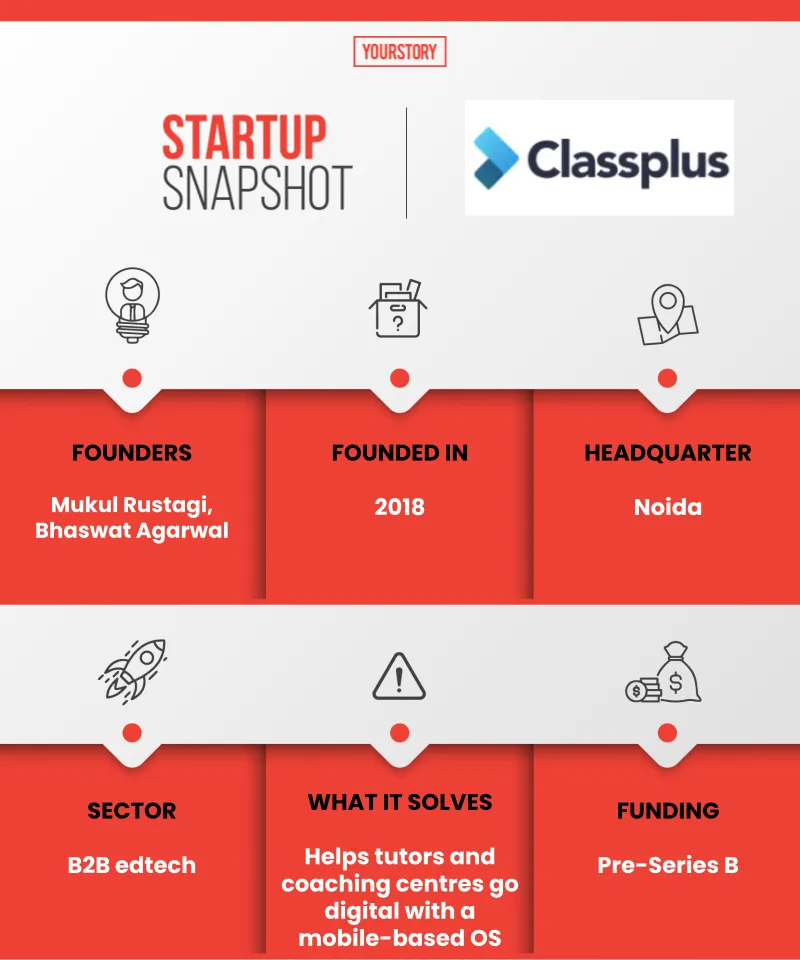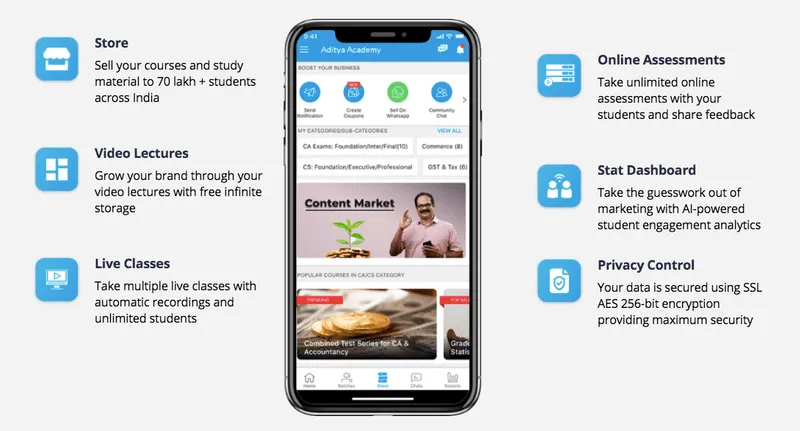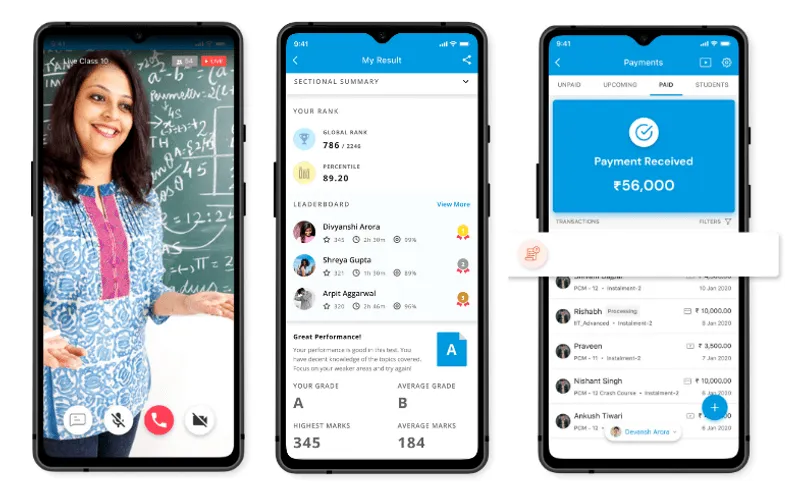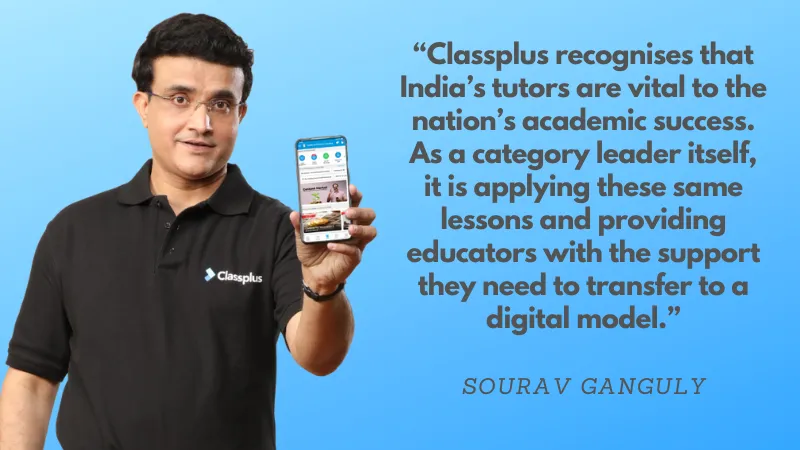Shopify for coaching: How Kunal Shah, Sequoia, and Blume-backed Classplus digitised 1 lakh tutors to serve 12M students
B2B edtech startup Classplus, which raised three rounds of funding in 2020, saw its tutor base grow 10X and topline surge 400 percent in the pandemic. Here’s how the ‘Shopify for coaching’ helps India’s private tutors stay relevant.
had very humble beginnings three years ago. Founders Mukul Rustagi, an IIT Roorkee alumnus who traded derivatives on the Chicago Mercantile Exchange, and Bhaswat Agarwal, who helped Microsoft Education design and sell learning products in India, had failed in their earlier ventures.
“We’ve known each other since school, and always wanted to do something on our own. Around 2015, we got back together, and did multiple experiments in education around 2016-17. Nothing really worked out,” Mukul tells YourStory.
Finally, in 2018, they began solving a pain point that had once been their own. Back in the days, when Mukul and Bhaswat were preparing for IIT-JEE entrance exams, their coaching centre shut down all of a sudden, leaving them in the lurch.

Classplus Founders Mukul Rustagi (R) and Bhaswat Agarwal
This was pre-Jio India, when education was entirely offline, and millions of students, especially in small towns, struggled to get access to good tutors.
But, by the time Classplus launched in 2018, learning had started to go digital.
Co-founder and CEO Mukul shares,
“After Jio, several B2C startups came in and targeted students directly. But, almost every location in India has 10-12 hyperlocal coaching centres, with the owner’s face plastered across billboards. The deeper you go, the more localised coaching centres are. These educators are superbly entrepreneurial and they get all their students via word of mouth."
"But, no startup in India had looked at this segment because it was seen as boring. And scaling up was always a challenge for them,” he says.
Shopify-like platform for educators
Classplus built a mobile-based SaaS platform to help private tutors and coaching centres take their brick-and-mortar set-ups online, thus becoming one of the early movers in the country’s B2B edtech space.
The Noida-based startup aimed to streamline a massive but fragmented offline coaching market, by helping tutors grow their business outside their limited pin codes, run all their coaching, communication, assessments, payments, and student engagement programmes through a full-stack mobile solution.

Infographic: YS Design
The founder elaborates, “There was a lot of software available on the web, but we didn’t believe in a free product. Trust was a deal breaker in this market. We told educators that we would grow their business and also give them a great student experience. They were using tech as a productivity tool for the first time in their lives. But, they need it to stay relevant in the digital age.”
Besides taking them online, Classplus also enables educators to sell their online courses and content and helps them grow their earnings. Its revenue model is a combination of a SaaS fee and a take rate (commission).
“There is no upfront investment. It is a pay-as-you-grow model. We grow only if our customer grows. In a world of Amazon versus , Classplus is Shopify if edtech was ecommerce,” Mukul says.
Until February 2020, Classplus grew steadily to cater to 3,000-odd tutors in 50+ cities, serving half a million students, and becoming a category leader.
But, after COVID-19 struck in March 2020, it witnessed frenzied growth.

Classplus digitised 1 lakh tutors across 1,500 cities since the March 2020 lockdown
Blitzscaling in the pandemic
With offline coaching institutes shutting down overnight, and education threatened like never before, Classplus had no option but to adapt quickly.
To ensure that students didn’t remain cut off from their private tutors for long, it rolled out new features like ‘Live Classes’ in 100 hours, and claims to have onboarded 5,000 new educators in the first seven days of the lockdown.
And in the 12 months that followed, Classplus’ tutor base grew 10X to cross 100,000 across 1,500 cities serving 12 million students.
Its workforce expanded as well: from 150 to 400 people. “There is hardly any pincode in the country where we don’t have a customer now,” Mukul states.
Without revealing specifics, Classplus claims its topline has grown “400 percent over the last 15 months”. About two percent of its educators teach international students too. They come from Indonesia, Vietnam, and other Southeast Asian countries that have a large hyperlocal tutoring market.

On the Classplus app, tutors can manage their classes, tests, payments, student communication, and even sell their video courses and educational content
The speed at which tutors have gone online since the lockdown is hardly surprising. “Private tutors were the worst hit, and they could have lost their primary source of income. So, there was no solution but to adapt,” Mukul says.
“Over the last six months, many people have started online teaching businesses for the first time, both in academic and passion courses,” he adds.
Classplus educators have conducted1.5 million live classes in the last 12 months, and “have multiplied their earnings by 5-6X by reaching out to students beyond their local geographies”. Almost 82 percent of coaching institutes have recorded better profit margins too.
Student-side engagement has also shot up. Since the March 2020 lockdown, learners have spent more than three billion minutes watching video content and practised one billion test questions on the Classplus app.
Mukul explains, “As more players have come into this segment, the market has grown. There is more awareness today. Even though a majority of teachers still believe in offline classes because the connect and ambience of a classroom is impossible to replace, the segment has matured. And COVID-19 has been instrumental in educating educators on how they can use technology.”

In December 2020, Classplus roped in former captain Sourav Ganguly as brand ambassador
Funding frenzy and future roadmap
In 2020, Classplus raised three rounds of funding — a $2.5 million pre-Series A round led by Sequoia Surge and Blume Ventures in February, which also saw participation from distinguished angels like Founder Kunal Shah; Alvin Tse, GM of Xiaomi-Indonesia; Eric Kwan, Partner at Locus Ventures; followed by a $9 million Series A round led by RTP Global in May, and a $10.2 million pre-Series B round led by Alpha Wave and Falcon Edge in September.
Following the last round, Classplus’ valuation reportedly soared by 82 percent. Prior to last year’s funding frenzy, the startup had raised $1.6 million from Times Internet and GREE Ventures in 2019. Japanese VC firm Spiral Ventures, and The Netherlands-based Rising Stars Fund also participated in that round.
Yasuhiro Seo, Founding Partner, Spiral Ventures, said at the time of funding,
“While there are a lot of firms working towards directly providing students with study material online, Classplus has taken a unique stand of empowering teachers with technology, which makes their business model scalable.”
The market Classplus operates in is quite enormous.
According to industry stats, India sees 70 million students opting for private tuitions and after school coaching every year. There are an estimated 7.5 lakh coaching centres run by a million-plus tutors, with the segment generating an annual cash flow of over $21 billion towards India’s education sector.
Classplus competes with the likes of Proctor, Classpro, eduZilla, SkoolApp, among others, and is looking to enroll 50 million students and 5X more tutors by the end of the year.
Mukul sums up the market thus, “The wave of internet penetration and smartphone access has opened up opportunities for tutor-led, tech-enabled learning, and the market is ready to be disrupted by data-driven remediation.”
Edited by Teja Lele










